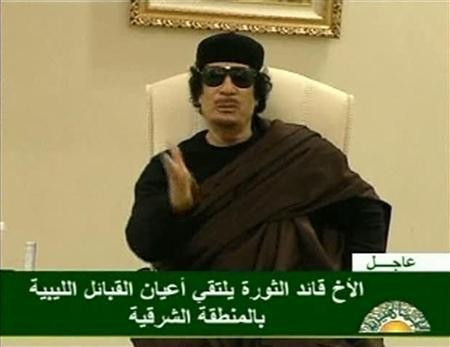Libya: Will Gaddafi Become the New Face of Terrorism?

With the National Transitional Council establishing itself in Tripoli, senior NATO leaders including French President Nicolas Sarkozy are visiting Libya for the first time since Col. Muammar Gaddafi was ousted.
NTC chief Mustafa Abdul Jalil has pledged the Western leaders "will be safe."
The alliance leaders are expected to fly first to Tripoli and then the rebel stronghold of Benghazi, where sources say speeches praising the revolution and the "new Libya" are set to take place in Liberty Square.
Sarkozy is expected to steal the show and capitalise on the rebel victory. But he is set to travel with 160 security officers, who will reportedly been in civilian clothes to melt easier into the background.
At a time when the African Union has refused to recognise the NTC government, NATO's move to introduce it on the world stage heralds a new era which will see Libya as a strong ally of the West.
In addition to discussions on the future of Libya and the next phases of the transition, the meeting and media attention it will attract will also send a clear message to the leaders of the African Union and countries that were critical of the NATO operation such as China and Russia and mark the "friendship" between NATO and the NTC.
Efforts to push ahead with changes are also being conducted by the UK, which has circulated a draft resolution to the United Nations Security Council aimed at relaxing the U.N. sanctions against Libya.
The U.S. has also been vocally supportive of the new Libyan government by praising the control the NTC is exercising over security forces in the country.
While NATO praises the NTC's efforts, parts of the country are still under the control of hostile partisans and bloodshed is continuing in Sirte on the Mediterranean coast, Bani Walid, southeast of the capital, and Jufra and Sabha in the south.
Even as many warn that too many weapons are circulating in Libya, Wednesday Jalil appealed for even more weapons.
Gaddafi has been in hiding since the rebels took Tripoli, and despite his calls for the continuation of the struggle he has not been able to launch a large counterattack. Many question the identity of the NTC opponents, suggesting that tribal divisions and not loyalty to Gaddafi are their main motivation.
But Libya's former leader is still taunting the NTC and Wednesday, a message purporting to have been written by Gaddafi was broadcast on Syrian TV, stating: "Terrorism and destruction exercised by NATO on the Sirte area is beyond description and has no match in past history of wars. You must bear your international responsibility and intervene immediately to stop this crime."
Even in hiding Gaddafi, remains a threat to the NTC. The new Libyan leaders now say the colonel is in southern Libya, plotting an attack on cities, oil fields and power plants after allegedly stealing "all the gold."
With Gaddafi poised to become the new face of "terrorism," many wonder how much of a threat the former leader really is. Despite being previously linked to terrorist acts it will be difficult for him to plan and prepare attacks outside of Libya, with his inner circle and forces dwindling.
While some African leaders are still sympathetic to him, supporting an attack would be a whole different story. It seems unlikely will become the new figure of domestic and international terrorism, but only time will tell if his threats are real or just the delusions of a fallen dictator.
© Copyright IBTimes 2025. All rights reserved.





















